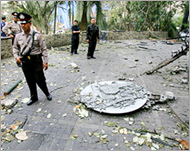Hunt goes on for Jakarta blast culprits
A nationwide hunt continues for up to 10 men, including a bomb-maker trained in Afghanistan, believed to be plotting further attacks against Western targets in Jakarta.

National police chief Da’i Baktiar said investigators last week
narrowly missed arresting their main suspects in the deadly 9 September bombing of the Australian embassy: British-educated engineer Azahari bin Husin and his accomplice Nurdin Muhammad Top.
Men fitting their description and two others believed to be Indonesian nationals were tracked to a tiny house on the outskirts of Jakarta on Tuesday afternoon.
Local residents say the men, who had spent four days in the neighbourhood, left the house just hours before police
arrived.
“They were very quiet and never came out of the house except to pray,” said one elderly woman, who refused to give her name.
Baktiar produced computer generated images of the suspects wearing a variety of different styles of dress and facial hair during a press conference on Saturday.
“They have recruited new squad members in West Java, Central Java and East Java,” he said.
Warnings
Both the US and Australian embassies advised their citizens to avoid the city’s busy Kuningan business district where the Australian embassy is located, and the nearby Rasuna Complex apartments which is home to many foreigners.
 |
|
Police believe the bombers are |
Australian ambassador David Ritchie said American intelligence sources told him of a specific threat to the multi-tower Rasuna Complex and urged residents to consider moving elsewhere.
Despite the warnings, which are believed to be the first issued about a specific Jemaah Islamiyah (JI) target, no obvious attempts have been made to improve security at the Rasuna Complex, which is less than 1km from the embassy.
Nine people were killed and more than 180 injured when a powerful bomb hidden in a panel van exploded on Thursday morning outside the heavily-fortified embassy.
All of the dead were Indonesian, including several embassy guards and a gardener.
Videotape footage of the explosion showed the white van stopping in front of the embassy gates moments before the blast.
Police, who re-enacted the incident on Sunday, believe at least two men were inside the van.
JI link
Forensic scientists say the bomb is similar in construction to those used in past attacks against Western targets in Indonesia that have been traced back to members of JI, an al-Qaida-linked regional terrorist organisation.
 |
|
The Bali blasts left more than 200 |
In October 2002, JI operatives using a passenger van loaded with potassium nitrate and a man wearing a bomb belt struck a crowded nightclub district in the resort island of Bali, killing more than 200 people, many of them foreign tourists.
Ten months later, a driver detonated a car bomb outside the American-owned JW Marriott hotel in central Jakarta killing a dozen people.
At his trial last month, a 23-year-old JI member testified that he had helped Husin and Top build the bomb used in the Marriott attack.
Baktiar said the JI cell lead by Azahari planned to attack an anti-terrorism school in the Central Java city of Semarang at its July opening, but called it off when faced with heavy security.
A host of VIP guests from Indonesia and abroad, including President Megawati Sukarnoputri and the Australian defence minister attended the inauguration of the school, to which the Australian government has pledged almost $37 million over the next five years.
Streets deserted
Jakarta streets were eerily quiet on Sunday as residents heeded government warnings that a second bomb attack was imminent.
Jakarta’s police chief said on Saturday he was deploying officers to 300 locations around the city, including businesses, hotels, shopping centres and embassies.
“I just came to buy some groceries and then we’re going home,” said German Karl Neu. “I’ve been here eight years, I didn’t leave when there was the violence in ’98 but now I’m thinking it might be time to make a move.
“If I’m alone it is one thing but now I have children of my own
and so I worry more.”
Timing
Meanwhile speculation continues as to the timing of the attack, which came exactly a month before Australian elections and 11 days before the final round of Indonesia’s presidential elections.
 |
|
Howard (L) says troops will stay in |
Australia has been a staunch ally of US policy and maintains 850 soldiers in Iraq, a position that has angered many Indonesians.
Incumbent Prime Minister John Howard has said the troops
will remain while his opponent Mark Latham had said prior to the embassy attack that he would recall them.
Bombings in Madrid days before March elections killed 191 people and led to the surprise victory of the main socialist opposition party which made good on its campaign promise to pull Spain’s troops out of Iraq.
If similar forces were at work behind the Australian embassy attack it would mark a major change in the relationship between JI and al-Qaida, says a leading expert on the group.
“There could be some connection to the elections but nothing I’ve ever seen in JI documents suggests there are elements within JI which are sophisticated enough to think about the Australian elections,” said American analyst Sidney Jones of the International Crisis Group.
“If there was that possibility that al-Qaida made contact with the Indonesians, then that would mark an evolution because this incident certainly serves al-Qaida’s goals far more than those of Indonesian operatives.”
Roughly 90% of Indonesia’s 220 million people are Muslim.